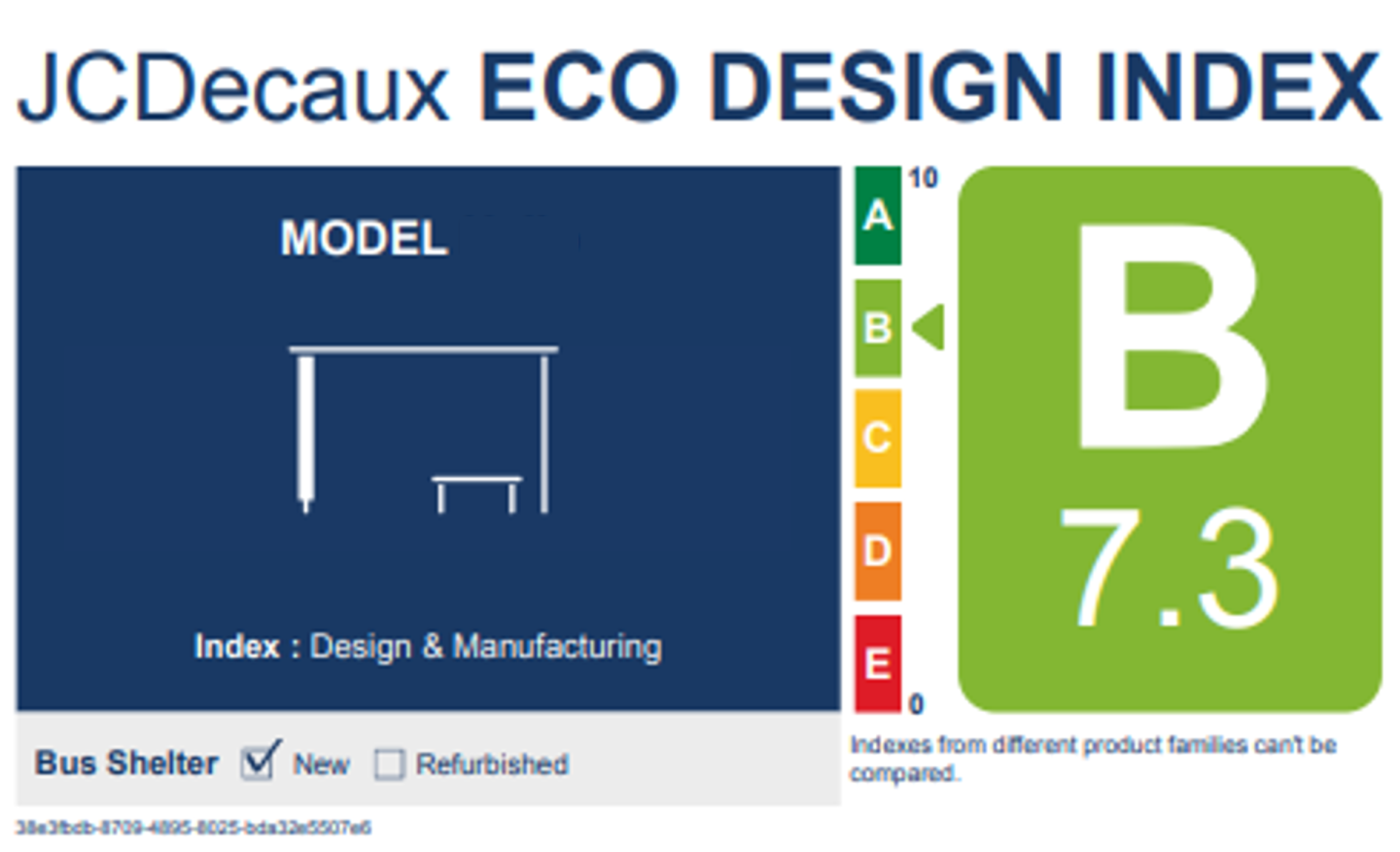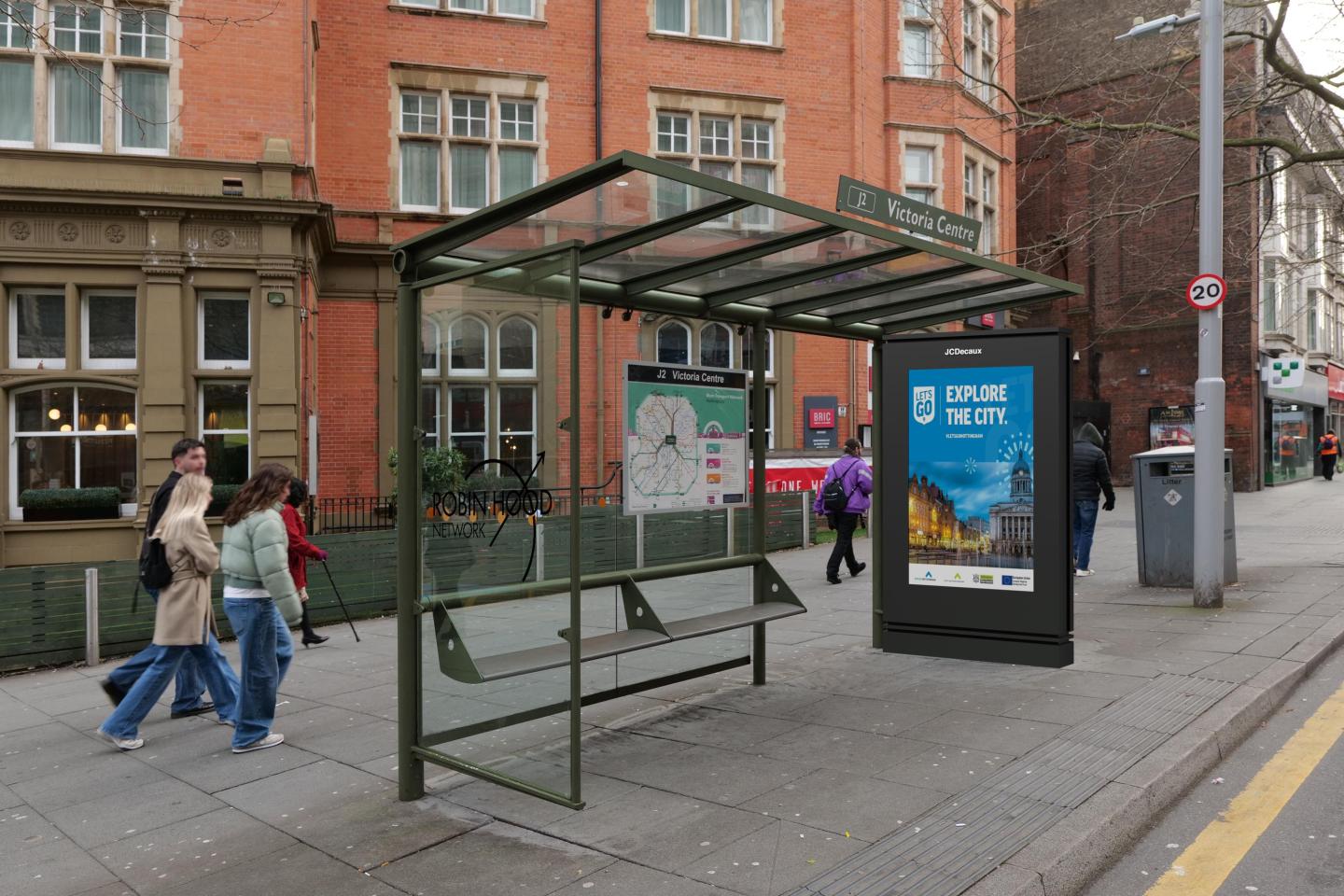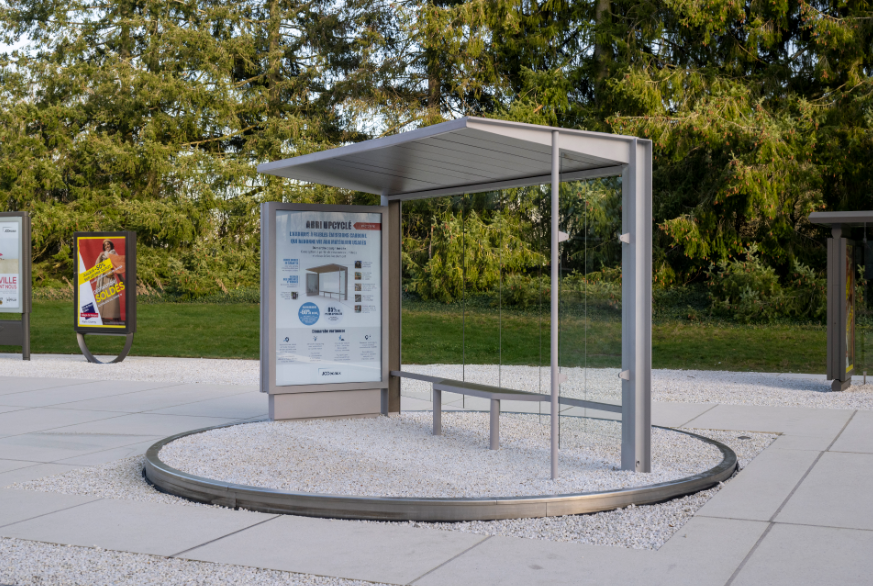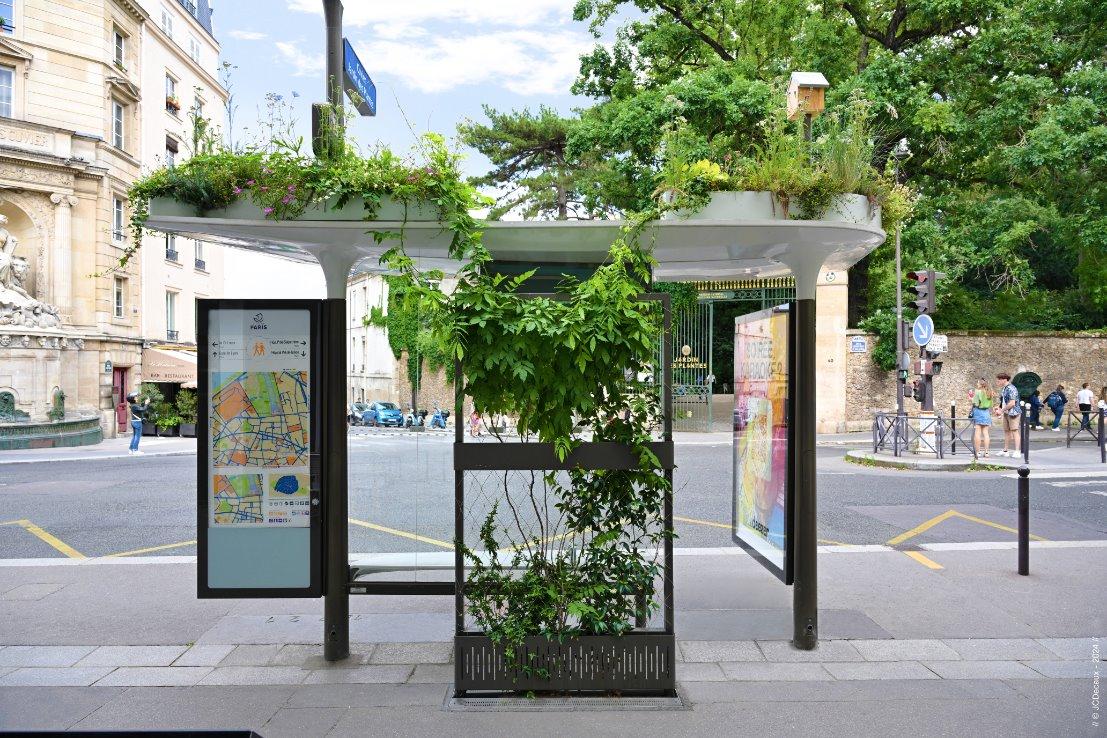Because we are committed to improve the quality of life in cities, transport hubs and retail outlets, we have chosen to systematise our ecodesign policy for all our furniture.

Gaëlle DAGORTFollowing on from the Abribus® bus shelter, invented in 1964 to improve the use of public transport, JCDecaux develops and deploys responsible, co-constructed and inclusive innovations to improve city life. Responding to new urban uses, they are also based on the Group’s fundamentals: sustainability, quality of construction and quality of service.
Group R&D Director
Reinforce ecodesign to improve environmental and social performance
Our objectives
Our result
Our ecodesign policy
The design of our street furniture and its operating methods is based on the analysis of environmental impact, from the extraction of materials to the end-of-life of the furniture.
- Principle 1: Ensure the quality of the furniture
- Principle 2: Anticipate a modular conception
- Principle 3: Use sustainable materials
- Principle 4: Use recyclable materials
- Principle 5: Use secondary raw materials
- Principle 6: Optimise the electrical efficiency of the furniture
- Principle 7: Use renewable electricity during the operational phase
- Principle 8: Limit the number of spare parts needed for each maintenance intervention
- Principle 9: Facilitate the refurbishing of furniture
- Principle 10: Ensure the recyclability of the furniture at the end of life
Our stretegy in actions
The wooden bus shelter
Environmental considerations are at the heart of everything we do. This applies to our street furniture: including the responsible choice of materials and the optimisation of raw materials in the manufacturing process, etc. Entirely ecodesigned, innovative and sustainable, the wooden shelter was developed using biosourced materials, reducing the environmental impact of this furniture.

The wooden shelter
The Eco Design Index
In 2024, we have launched the JCDecaux Eco Design Index (EDI), a tool based on a new methodology audited by an independent third party. The tool goals’ is to access and compare the environmental impacts of our products as well as their performance in terms of eco design. EDI helps to raise awareness among all stakeholders about these important issues and provides the opportunity to make increasingly informed choices internally and externally. The environmental performance is assessed on a scale of 0 to 10. This numerical score is then translated into an index from A to E for a simple and educational representation, “A” corresponding to the best assessment.

Develop and deploy our responsible innovations and our sustainable furniture
Our research and development structure, with nearly 200 engineers, designers and developers, are able to transform new ideas into sustainable and effective furniture. Our R&D teams draw inspiration from ESG as well as tools and methods that are focused on the ecodesign of the services offered by the Group.
Our objectives
Challenge our responsible innovations
We have made innovation a powerful lever for sustainable, responsible growth and differentiation. Since our creation in 1964, we have never stopped reinventing ourselves to offer services that meet the needs of local communities and citizens in the countries where we operate.
Innovation is the company's driving force, responding to all our stakeholders: cities, citizens, brands and consumers, transport and passengers.
In line with the Group's 2030 ESG roadmap, we have defined 7 main areas of innovation:
- Greener cities and cleaner air: propose features that help improve urban quality of life
- Safer and cleaner spaces: help cities to face new issues
- Soft and shared mobility: develop systems to encourage micromobility
- Inclusive and people-oriented cities: contribute to local life and the local economy
- Furniture connectivity: make our furniture into instruments of measurement for cities and its users
- Reduce our furniture footprint: reduce our footprint with energy-efficient or even autonomous systems
- Operational excellence: continually improve our processes and work to meet all challenges
Furniture refurbishment in a circular approach
Reusing furniture from one contract to another, or renovating it on site by adding functions or improving the design, is a direct way of saving the planet's resources.
Refurbishment involves extending the life of furniture at the end of the contract, by preserving and renovating its structure and most of its components. Components that cannot be repaired are replaced by new generation components, such as LED lighting technologies. This allows furniture to have multiple lives and provide quality service for at least 30 years.
Refurbished furniture can reduce emissions and costs by up to 70% compared to the manufacture of new furniture. By 2030, refurbished furniture could represent 50% of all non-digital assets deployed.
This cannot be done without a rapid transition in public and private procurement, as it is a key driver to support their transition towards a circular economy, across all geographies, and towards more responsible solutions.
Our stretegy in actions
Refurbished bus shelters in Nottingham
In 2024, JCDecaux won the Nottingham’s (UK) tender for street furniture, for a duration of 15 years. All 800 bus shelters in the contract will be totally refurbished and rebranded, and will include energy efficient LED lighting helping to work towards the city’s carbon-neutral goals. We will be introducing ‘smart city’ tech, providing free Wi-Fi and air-quality monitors across the city centre, enabling the council to access real-time air quality information across the city via an app - all funded by advertising.

Refursbished bus shelter in Nottingham, UK
The upcycled bus shelter
Reducing emissions from our furniture is crucial to achieving our goal of carbon neutrality by 2050. For historical furniture, the environmental impact of materials accounts for 75% of its footprint. That's why we've designed the Upcycled Shelter, made from used and recycled materials from the Group's own operations and those of other sectors, including production waste and scrap, as well as materials from deconstruction sites.
The design of this furniture allows a 60% reduction in GHG emissions compared to standard furniture. This gain is mainly achieved through the use of upcycled pieces and recycled materials, which make up 84% of the total mass of the furniture.
Our upcycled traveller shelter has been added to our furniture catalogue, and is promoted to our clients during meetings.

The upcycled bus shelter
Preserve and enhance biodiversity in cities
Thanks to studies by the IPCC, IPBES and SNB, the responsibility of human activities in the erosion of biodiversity and ecosystems is now common knowledge. JCDecaux, as a world leader in the design and maintenance of street furniture, wishes to contribute to the reintegration of nature into the city and thus participate in the preservation and restoration of ecosystems.
Our objective
Our approach to protecting biodiversity
Our media is also subject to numerous codes and regulations, particularly in the context of public procurement. However, the protection of biodiversity is an integral part of the Group’s ESG Strategy. The latter contributes to the development of biodiversity in cities through the deployment of solutions such as the revegetation of furniture for example.
This approach is based on eight pillars corresponding to the action plans suggested to companies to commit to biodiversity:
- Innovate by drawing inspiration from living things: biomimicry, bioinspiration and nature-based solutions
- Strengthen its local roots by preserving or restoring local ecosystems
- Anticipate regulations and facilitate the integration of future constraints
- Give meaning to its activity and respond to the sensitivity of its employees
- Improve its image through concrete commitments and certifications
- Secure its supply by promoting sustainable production methods that respect ecosystems
- Guarantee access to land through a real estate policy that minimizes sminimises land use
- Access new types of financing linked to biodiversity criteria.
Our stretegy in actions
Biodiversity in Hamburg
In Hamburg, we worked with the German Fauna and Flora Foundation to install bus shelters with green roofs, part of our experiment to stimulate biodiversity in the city. The project has been a success, attracting 49 species of bees and wasps including a number that are very rare. Five new shelters of this type will be installed in the city in the near future.

Bus shelter with green roof in Hamburg, Germany
Biodiversity in Paris
In 2024, the Group deployed a large-scale experiment in Paris around a greening concept designed to preserve biodiversity. These systems, which include horizontal and vertical plants, as well as bird nesting boxes, make it possible to link two parks or gardens in the city by means of a path created using street furniture. 19 plant-covered street furniture structure are creating this experiment.

Greened bus shelter in Paris, France
